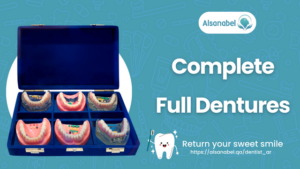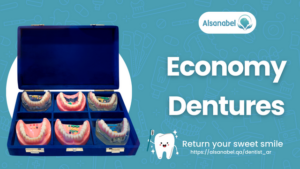Modern dentistry has revolutionized the process of creating dentures, making use of digital technologies for precision and comfort. In this post, we’ll delve into the diverse range of denture options available—fixed and removable—and discuss how they are tailored to the unique oral conditions of each patient. Join us as we simplify the complexities of choosing the right type of denture for you.
Table of Contents
Toggle1-Complete Full Dentures
Complete full are prosthetic devices used to replace missing teeth in individuals who have lost all of their natural teeth. They are custom-made at the best dental clinic in Qatar to fit the patient’s upper and lower gum tissue and restore the functionality and appearance of natural teeth.

- Composition: Made of acrylic resin with porcelain for durability and a natural look.
- Impressions and Fittings: Custom-fit through impressions and multiple fittings for comfort.
- Natural Appearance: Resemble natural teeth and gums to match facial structure and smile.
- Functionality: Restore chewing, speaking, and smiling with proper fit and adjustment.
- Adaptation Period: Patients may need time to adjust to wearing denture.
- Maintenance: Daily cleaning and regular dental visits for adjustments and evaluations.
- Bone Resorption: Long-term wear can lead to jawbone resorption, affecting fit and requiring adjustments.
- Alternatives: Implant-supported denture offer stability and prevent bone loss but involve a more complex process.
2-Partial Dentures
Partial denture serve as removable dental appliances to replace missing teeth while some natural teeth remain. Here’s a breakdown:
- Composition: Partial denture features a framework of metal, acrylic, or a blend of both, supporting artificial teeth that match the color, shape, and size of natural teeth.
- Types: Traditional removable partial denture uses clasps or connectors to attach to natural teeth, while precision attachments offer a more discreet and aesthetic appearance.
- Functionality: They restore chewing, speaking, and smiling comfort, while also maintaining the alignment of remaining natural teeth and preventing shifting.
- Customization: Each partial denture is custom-made, with impressions taken to ensure a precise fit and function.
- Adaptation Period: Patients may need time to adjust to wearing partial denture, with potential adjustments required for comfort and function.
- Maintenance: Daily cleaning and regular dental check-ups are crucial for their longevity and effectiveness, ensuring removal of food debris and plaque.
- Bone Preservation: Partial denture supports remaining natural teeth, preserving jawbone structure by evenly distributing chewing forces.
- Alternatives: Dental bridges or implants offer fixed solutions but may involve more extensive procedures and higher costs compared to partial denture.
3-Custom Dentures
Custom denture is precisely crafted prosthetic devices designed to replace missing teeth and surrounding tissues in a patient’s mouth. Here’s what sets it apart:
- Personalized Fit: They’re tailored to the unique contours of the patient’s mouth, ensuring comfort and minimizing the risk of irritation or sores.
- Natural Appearance: Designed to closely resemble natural teeth and gums, enhancing appearance and restoring smiles.
- Materials: Made of high-quality, durable materials like acrylic resin or porcelain, capable of withstanding chewing forces.
- Functionality: Restore chewing, eating, speaking, and smiling confidently with excellent stability and support.
- Collaboration with Professionals: Fabricated in close collaboration with dental professionals to meet the patient’s needs and preferences.
- Adaptation Period: Like other dentures, they may require an adjustment period for optimal fit and comfort.
- Maintenance: Proper care and regular dental visits are essential for longevity and effectiveness.
- Cost: While more expensive, the benefits of superior fit, comfort, and aesthetics often justify the investment.
4-Immediate Dentures
Immediate denture is a type of removable dental prosthesis ,which is made at best dental clinic in Qatar, inserted immediately after natural teeth extraction. Here’s a closer look:
- Preparation: Impressions are taken before tooth extraction to create immediate denture in advance.
- Immediate Placement: Dentures are inserted directly after extraction, providing immediate replacement teeth.
- Protection and Aesthetics: They protect extraction sites, control bleeding, and restore function and aesthetics immediately.
- Temporary Nature: Designed for the initial healing phase, they may require adjustments or relining as gums heal and change.
- Healing and Adaptation: Gums reshape during healing, impacting denture fit. Regular follow-ups ensure proper adjustments.
- Transition to Permanent Dentures: Once gums stabilize, patients may transition to permanent denture through fabrication or adjustment.
- Maintenance: Proper care and hygiene are crucial for longevity and effectiveness.
5-Implant-Supported Dentures
Implant-supported denture is dental prosthetics ,which is made at the best dental clinic, that combine traditional one with dental implants for stability and support:
- Implant Placement: Titanium posts are surgically placed into the jawbone, serving as artificial tooth roots. The number of implants varies based on the case and denture type.
- Attachment Mechanism: Dentures have attachments or connectors that snap onto implants, ensuring stability during eating, speaking, or smiling.
- Types:
- Bar-Retained Dentures: A metal bar attaches to implants, providing stability as the denture clips onto it.
- Ball-Retained Dentures: Implants have ball-shaped attachments fitting into sockets on the denture for a secure yet removable fit.
- Hybrid Dentures: Fixed to implants permanently, resembling natural teeth in function and stability.
- Benefits:
- Improved Stability: Reduced slipping or shifting compared to traditional denture.
- Enhanced Chewing Efficiency: Better stability allows for more effective chewing, expanding dietary options.
- Preservation of Jawbone: Implants stimulate the jawbone, preventing bone loss and preserving facial structure.
- Improved Comfort: More natural feel due to not relying solely on suction or adhesive.
- Procedure: Involves several appointments over months, including implant surgery, osseointegration healing, and denture fabrication and fitting.
- Maintenance: Requires daily oral hygiene, including brushing and flossing around implants and under the denture, along with regular dental check-ups.
6-Snap-in Dentures
Snap-in denture, also known as overdentures or implant-retained, offer stability with the benefits of traditional one. Here’s how it work:
- Implant Placement: Dental implants serve as anchors, usually two to four strategically placed into the jawbone.
- Attachment System: The denture has snaps that connect securely to the implants, providing stability while allowing easy removal for cleaning.
- Versatility: They can replace a full arch or a few missing teeth in both upper and lower jaws.
- Benefits:
- Improved Stability: Anchored to implants, they offer much better stability than traditional denture, enhancing confidence in eating, speaking, and smiling.
- Preservation of Jawbone: Like other implant-supported prosthetics, they stimulate the jawbone, preventing bone loss and maintaining facial structure.
- Comfort: More natural feel due to not relying solely on adhesive or suction, and they distribute chewing forces evenly.
- Improved Chewing Efficiency: Better stability allows for more effective chewing, expanding dietary options.
- Maintenance: Requires regular oral hygiene, including brushing and flossing around implants and under the denture, along with daily cleaning of the denture itself.
- Procedure: Involves several appointments over months, including implant placement surgery, osseointegration healing, and denture fabrication and fitting.
7-Economy Dentures
Economy denture, also known as basic or standard one which is made at the best dental clinic, offer a more affordable option for tooth replacement compared to custom or premium. Here’s what to know:

- Cost: They are typically less expensive due to mass production, reducing manufacturing costs.
- Materials: Made from standard acrylic resin or other cost-effective materials, they provide a functional solution for tooth replacement.
- Standard Fit: Designed to fit a wide range of patients without extensive customization, they may not offer the same level of comfort or precise fit as custom-made.
- Aesthetics: While they may have a more generic appearance, they still provide a natural-looking smile for many wearers.
- Durability: Though durable for everyday use, they may not be as long-lasting as premium denture due to lower-quality materials and manufacturing processes.
- Availability: Readily available through dental clinics and centers, they are suitable for individuals on a tight budget needing basic tooth replacement.
- Considerations: While affordable, they have limitations in comfort, fit, aesthetics, and durability compared to custom-made. Patients should discuss their needs and preferences with their dentist.
We’ve explored the wide array of denture options to help you navigate the world of dental prosthetics. Remember, your dentist at the best dental clinic in Qatar is your partner in this journey, and they’ll provide guidance tailored to your individual needs. Now, we’re eager to hear from you—what concerns or questions do you have about denture? Share your thoughts with us, and let’s continue to support each other in our dental wellness.
